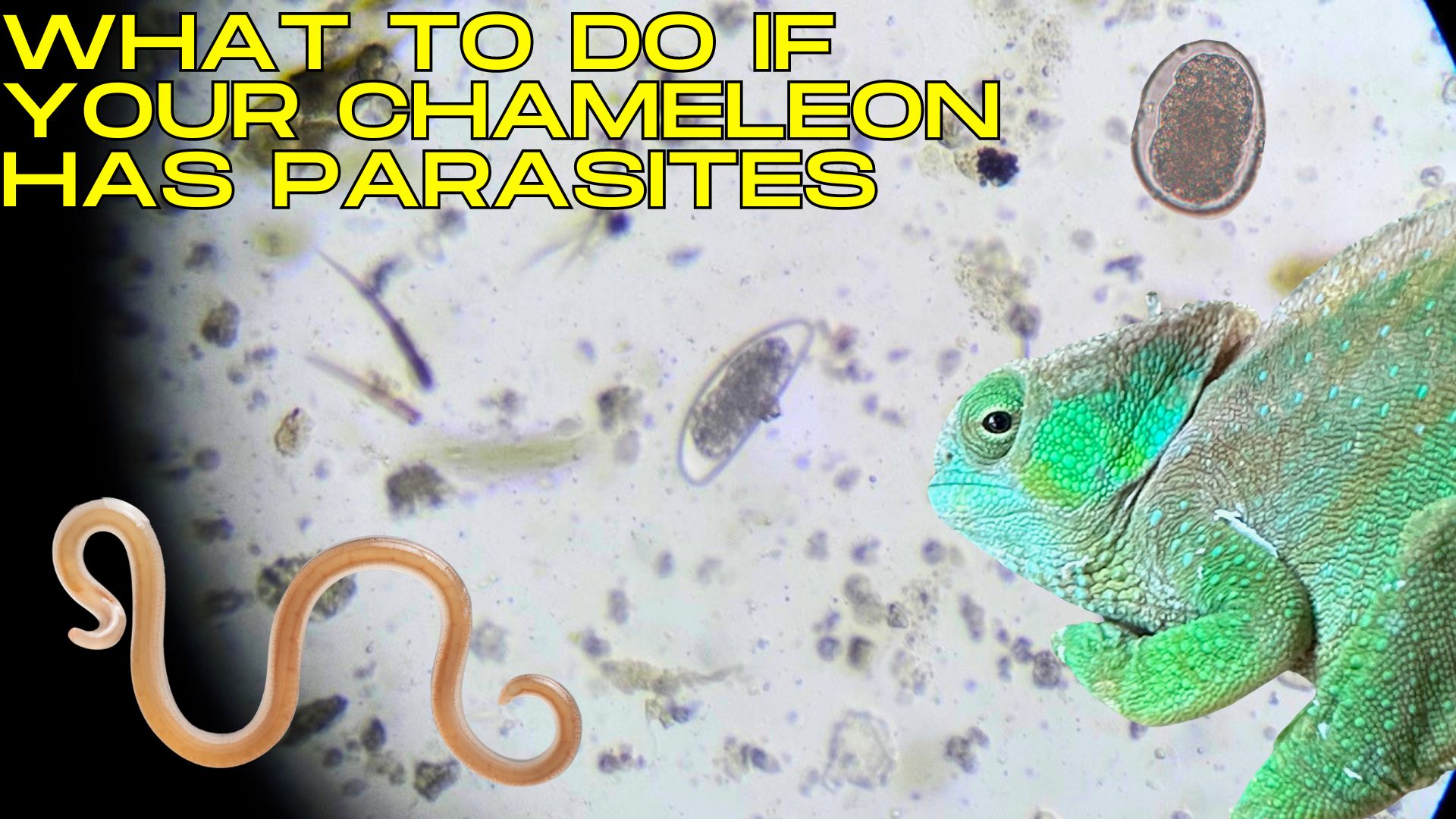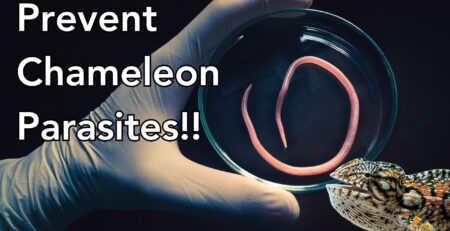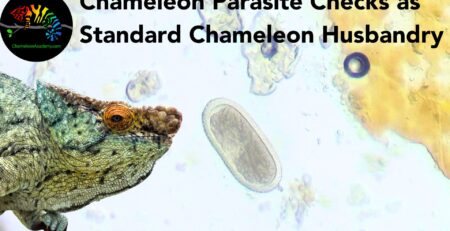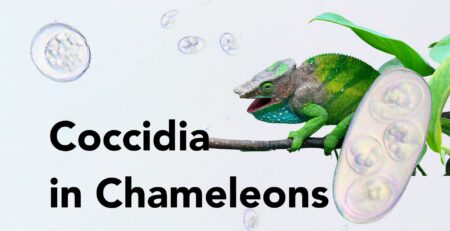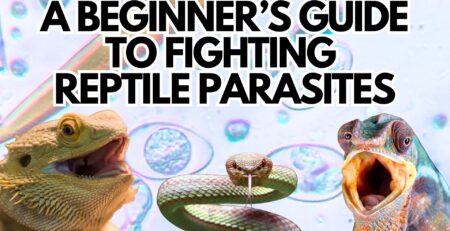What to do when your chameleon has parasites
Have you just learned that your chameleon has parasites? I will go over what you need to know, what you need to do, and why you do not have to panic. This page will take about ten minutes and will give you an overview of the information you need to know if you have just been told your chameleon has parasites.
Video Player
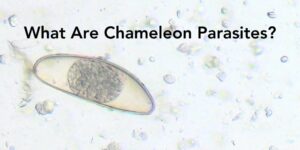
What are chameleon parasites?
Parasites that infect chameleons are much like parasites that affect any other animal. A great many of them are microscopic and live inside your chameleon’s body. The intestinal tract is a favorite place to live because it is nutrient rich, but you will also find parasites in the lungs, blood, liver, under the skin, and living inside the body cavity. If this is the first time you are learning about parasites this may be a completely disgusting concept. I can’t argue with that, but I can say that parasites are a normal part of life everywhere on Earth – including humans. If that is the bad news, the good news is that a light parasite load is actually normal and nature for your chameleon. Even though we will definitely want to treat for those parasites, the fact that they were found in your chameleon is not a reason to panic! With common medication and an attention to cleaning practices, you will be able to mostly clean your chameleon of parasites and keep the infection from returning. I am sure you noticed I used the word “mostly”. The fact is that it is difficult to fully rid any living animal of parasites. We do our best, but keeping your chameleon free of parasites is not a one time event, but a constant husbandry practice.

The immune system is your #1 medicine against parasites!
If your chameleon is sick your vet will often ask for a fecal sample to test of parasites. When a chameleon is lethargic or perches with its eyes closed there is something going on inside. This can be a number of things including a bacterial infection or parasitic infection. It is not uncommon to find that your sick chameleon has parasites. If so, your vet will find out what kind of parasites and give you the correct medicine to knock down the parasites.
But this is only part of the problem! The medicine will kill the parasites, but will not take care of the original problem! The tricky thing is – it may not be the parasites that were the real problem!
Let me explain:
Parasites are a normal part of life in the wild and the chameleon’s body has developed a balance. The immune system keeps the parasite levels from getting out of control. One reason why parasites make so many eggs is because the immune system keeps killing so many of them! It may surprise you to learn that the parasites actually depend on the immune system for their survival! This is because if the immune system gets weak it will not be able to keep the parasites under control and the parasite population will spiral out of control and either slow the chameleon down enough that it is eaten or the parasites take too much and kill the chameleon themselves. And then all the parasites die as well – so the immune system is the critical component to maintaining balance that benefits both the parasites and the chameleon!
So if there is a dangerous level of parasites it is because the immune system has been overwhelmed. This can happen for two main reasons. The first is that the chameleon has ingested more parasites than usual and the second is that the chameleon’s immune system has been weakened. Medicating your chameleon will take care of the immediate problem, but you will need to take care of what caused the problem in the first place or the problem will return.
The important message to take away is that, yes, we need to treat the bloom of parasites, but we also must realize that those parasites are just a symptom of the real problem! We must both give medicine and fix the husbandry problem that allowed it to happen to begin with.
Building back your chameleon's immune system
Your chameleon’s immune system reflects the overall health of your chameleon. If you have a parasitic infection you must give medication to help the immune system get on top of the infection, but you must also figure out why it was weakened in the first place. Here are the points to check that contribute to a strong immune system. Go through each one and bring them all back to top level.
- A Sense of Security. Constant stress kills living creatures. One of the biggest problems with chameleons in captivity is that they do not feel safe. Chameleon’s feel safe when they are able to be higher than you and they know they have a plants to hide behind if they feel threatened. If they are feeling constantly vulnerable the stress will compromise their immune system and will allow parasites, bacteria, fungus, viruses or any of the myriad of opportunistic organisms always around us to take hold and blossom out of control. One of the biggest surprises new keepers have is that your chameleon’s emotional health is as important as its physical health. A stressed chameleon will die. Your necropsy may say death was a result of an overload of parasites, a respiratory infection, or any of the other types of infection, but the real reason was the stress that weakened the chameleon and allowed those other organisms to get out of control. And this is why all the little aspects of chameleon husbandry are critical for their life.
- Nutritious Diet. Your chameleon’s body needs nutritious food to run properly. This means making sure your chameleon has a variety of insects to eat, that the insects are given food themselves before they are fed to your chameleon, and that a proper supplementation regimen is followed.
- Hydration. You can tell if your chameleon is well hydrated by their poop. A moist poop means well hydrated. A dry poop or none at all is a danger sign. The body needs water to run properly!
- Hygiene. A dirty cage is a great way to help parasites get out of control. Poop needs to be picked up immediately. The poop is what the parasites use to get eggs out into the cage. The parasites do not expect most of their eggs to survive or get back to a chameleon. If you keep poop and your chameleon in a small space you a drastically increasing the odds that your chameleon will get an overdose of parasites!

My chameleon is healthy. How can it have parasites?
Even a healthy chameleon may have parasites. In fact, your chameleon could have parasites its entire life and if you take good care of it and have good hygiene, you may never know. It is people that have good husbandry that are surprised when, during a routine annual checkup, the vet says they found parasites.
If this is you, you do not need to panic. If your chameleon is healthy then it should be able to go through the deparitization easily.
You will, of course, wonder where your chameleon got its parasites from. It could have come from the breeder or even from the reptile show that you or anyone who visited you went to. Although we have a strong desire to figure out how it happened it will be very difficult to determine how a single captive hatched chameleon household ended up with parasites. The problem is that the most obvious explanations are not always the correct ones. The important thing is to determine how to go forward. Since your chameleon is healthy its immune system is obviously in good shape and so the husbandry may be good. It is still worth checking the husbandry, but, in the case of a healthy chameleon with parasites the solution may be as simple as giving medication that your vet gives you and paying extra attention to breaking the parasite life cycle.
Breaking the chameleon parasite lifecycle
There are three steps to breaking the parasite lifecycle.
- Eliminate the adult parasites. Adult parasites producing infectious offspring need to be eliminated by medicating and reviewing husbandry to get the immune system working 100%
- Remove infectious material. Be obsessive about thoroughly cleaning up the poop as soon after it hits the ground and removing any leaves that could be in the way of the poop on the way to the floor.
- Disrupt the return path. Supervise feeding time to ensure that no insect can escape, take a trip to the bottom of the cage, pick up eggs and oocysts, and then get eaten. Use feeder run cups that insects cannot get out of, strictly supervise jumping or flying food, and, if there is a contamination concern, you can even remove the feeders after 30 minutes if the chameleon has not eaten them.
By instituting these steps as a normal part of your chameleon husbandry, whether you have parasites or not, you will break the lifecycle of any parasites that are present or ever find their way to your chameleon in the future.
Conclusion
Finding your chameleon has parasites can be a shock, but once you know their lifecycle and how to break it, they are completely manageable. The more you know, the better able to fight them. The Chameleon Academy offers a digital course, Hunting Microscopic Chameleon Parasites, which teaches you how to do your own chameleon fecals at home. This course assumes no prior knowledge and will lead you through parasite basics, getting your own microscope, learning how to set up your slides, and how to identify parasites. You will get an understanding of the medications, how to do an effective quarantine, and learn enough to be able to be an educated partner with your veterinarian for your chameleon’s health. If you are interested in this training you can find more information here:

